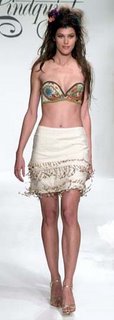The message was clear despite very convoluted and challenging questions of whether sustainable development is in fact feasible. The answer: We have reached a point where we are uncertain of it, but we must move forward and act quickly - not alone, but together. Not as a country, but as a world, because global issues know no boundaries. Scientists were calling for 5 years of a seemingly complete 180 degrees in policy, in carbon control, etc. for it to make a difference in the 10 years that we have before the world undergoes great change due to the human-induced climate.
In general, for those who have worked closely with the government, the message was dire. Disillusionment was strong. For those who tended to work more with students, with young people, the message was more optimistic. The disparate nature in pessimism vs. optimisim was a time-scale issue. Those who worked with government understand that we must act now....not wait 10 years for all the spectacularly able social entrepreneurs to get their MBAs and build their companies and NGOs. It was a strong call-to-action to everyone there, young and old, man and woman. But the important point was made: the people here are the ones that know that. We need to get a whole mass of public that isn't there to move with us.
Preeminent scientists, economists and officials from around the world spoke on issues of climate change, poverty, disease, financial markets, government, alternative energies. "Pressure the government for proactiveness, not reactiveness," "better journalism in mainstream press," "move more markets," "more science at a more rapid pace," "governmental mandates to curb carbon emissions." Those were some of the themes that came across the radar. One man, Joseph Romm, Executive Director for the Center for Energy and Climate Solutions made the eerie statement that CO2 will drive all environmental policy (ideally) in the near future" if we are to see salvation. He made the statement that Hydrogen cars may be the future, but not until way in the future, like 2050. Biofuels will not be a strong market. There are too many barriers. Over the next 20 years, policy in transport has to be efficiency.
Why? He gave 7 barriers to alternative fuels
- High first cost for vehicle
- Storage
- Safety and liability
- High fueling costs
- Limited fuel stations
- Not a cost-effective pollution reducer (i.e. ethanol from corn is a high-intensity crop_
- Tough competition from hybrids, which have already established themselves in the marketplace
It's interesting, you know, if we in fact, listened to Jimmy Carter's precautionary tale of energy back in April of 1977 ("The President's Proposed Energy Policy. 18 April 1977. Vital Speeches of the Day. Volume XXXXIII No. 14. May 1977. pp. 418-420). If we were more of a proactive society, the world wouldn't be in such dire straights. One thing is for certain, we need strong leaders, and a strong President to step up to the plate, who fully understands the issues, who can take the heat and make world change....after all, we are deciding the fates of not just the voters, but for all the non-voters throughout the world (and I'm not just talking about the people on the planet)... Throughout the 2-day discussion, I was experiencing a series of incredible highs-and-lows. Within 30 minutes, I was able to write my speech for SBN's April 20th talk because I was so inspired, but as of yesterday, I just felt so helpless, pissed, and then invigorated again. I even called my mother, which I never really do unless I'm so extremely irked (and then usually get more pissed after talking with her, confessingly). It is an internal maelstrom. It makes you look at the big picture, makes you look at your own work with both insignificance and significance to the larger picture. Makes you wonder how much more you can push. Makes you want to prioritize as much as possible. It is the fuel for what passion is made out of. And you can't only help but wish it was the same god-damn passion that drives others.... SUMMARY of speakers:
 SPEAKER 1. Jeffrey D. Sachs, Director of the Earth Institute at Columbia University; Special Advisor to UN Secretary-General Kofi Annan (you may have also seen his "Into Africa" movie with Angelina Jolie on MTV not too long ago)
SPEAKER 1. Jeffrey D. Sachs, Director of the Earth Institute at Columbia University; Special Advisor to UN Secretary-General Kofi Annan (you may have also seen his "Into Africa" movie with Angelina Jolie on MTV not too long ago) "Sustainable development is one of the most neglected topics, but one of the most central themes...if we are to bequeath the earth to the next-generation." "We break down the lumbering term of sustainable development as the following: "Development" as improved material conditions (food, water, shelter, transport, communications, technology) and "Sustainable" as environmental sustainability. Five sixths of the world do not live in sustainably developed conditions. 1 out of 6 (1 billion) live in extreme material deprivation. We must narrow the gap between rich and poor with continuing material well-being withou undermining ecosystems and the physical system of the planet. The issues, as we see them, are finally reaching the centrality that it finally needs (Time Magazine see current issue of "Be Scared. Be Very Scared." and 60 Minutes episode 19 March 2006 with Jim Henson, Wall Street Journal, The Economist, NY Times, etc.)...."
"Every major ecosystem is under threat. It should be the #1 talked about issue. Our ecosystem is facing profound effects. It is at the core of our survival...Both the Carbon cycle and Nitrogen cycle, once natural processes are now dominated by antrhropogenic intervention. We are on an unsustainable trajectory. Global climate change is one that we are talking about. It affects the biophysical systems - pathogens, pests, precipitation, ability to grow crops, acidification of oceans, massive dire consequences of corals, fisheries, and other ecosystems."
"The world is not staying where it is. We are not staying where we are. 6.5 billion people now, 9 billion by mid-century."
"Helping global poverty will HELP, not hinder. There will only be a 6% increase in carbon emissions if the poorest is lifted out of their poverty. We can tkae 71% of the wood fuels down to 17% and take pressure off of biomass. We need a massive security, humanitarian, and environmental point of view to move that." "Those who say it's the end of oil, in one sense is not right. Good news is that we won't run out of fossil fuels for centuries, but bad news is that we won't run out of fossil fuels for centuries...We need to decarbonize our energy. We need a sustainable energy system...We also need new ways to grow food - both marine and terrestrial - most deforestation right now is for arable land."
"The basic problem is that we have no politics. We are fighting all the wrong wars..." "The gap between science and politics is too significant. We will require massive improvements in science and technology if we want 9 billion people living on this planet in a sustainable, safe way. Science has to be at the center of this. We need a government to adsorb the science of it. Right now, they have to interface to act between science and policy. Our politicians don't have the expertise. It is NOT a major unsolvable, but it is a major solvable problem."
"There is no such thing as a superpower anymore. No definition for it. Ability to solve these problems is only solvable at global levels of cooperation. Global solutions are real. The U.S. can't lead this. We need international harmony. We need institutions to look after the future."
"We need a deeper understanding of science. It is our pathway to survival."
"EVERYTHING WE THINK IS AT THE CENTER OF GEOPOLITICS IS NOT THE BIGGEST CHALLENGE. IT IS A DISTRACTION, A MISUNDERSTANDING. IT IS NOT US AGAINST THEM, BUT ALL OF US IN THIS TOGETHER."
SPEAKER 2. Steven E. Koonin, Chief Scientist, BP - "Mobilizing Research and Ingenuity for the World's Needs"
"There are 4.5 trillion barrels of oil left at reasonable prices. One billion will be needed over the next 25 years." BP is investing a bit in solar and biofuels, but it will be largely focusing on oil still and...nuclear...which is a bit scary.
SPEAKER 3. Jomo Kwame Sundaram, Assistant Secretary-General for Economic Development, Dept. of Economic and Social Affairs, United Nations - "Needed Reform to International Economic Governance for Development"
"Only 4% of economic growth only goes down to people who live on < $2/day ....How is this sustainable development? How can we begin to do sustainable development with financial deepening?"
"Middle income countries have tried to break free of financial liberalization and away from the IMF...Trade development usually follows development, not precedes it. Premature trade liberalization undermines economic capacity."
"Only five countries will benefit from trade liberalization: Brazil, Argentina, India, China and Vietnam. The three former from agricultural trade liberalization, the two latter from manufacturing trade liberalization."
SPEAKER 4. Rajendra K. Pachauri, Director General, The Energy and Resources Institute; Chairman, Intergovernmental Panel on Climate Change. "Evolving Institutional Structures for Sustainable Development: Connecting Macro Policy with Grassroots Action."
"Some societies and governments that can't adsorb science get and remain static in the state of development."
"The battle for peace has to be fought on two fronts. The first is the security front where victory spells freedom from fear. The second is on the economic and social front where victory means freedom from want. Only victory on both fronts can ensure a world of enduring peace." - US Secretary of State Edward Stettinius, 1945 at the San Francisco Conference on the United Nations.
Some Downsides of the Millenium Development Goals (MDGs)
- Energy is missing in the MDGs
- Consideration for natural resources, what are the MDGs ecological implications?
- Technological development and innovation not included
- Human resource development
- Upward flow of knowledge and experience
"Extreme poverty can be ended not in the time of our grand-children, but our time." - Jeffrey Sachs
Introduction to TERI. It is The Energy and Research Institute which designs renewable and affordable products and services to the members at the BOP (bottom of the pyramid). They focus on designing programs for local conditions with local capacity.
"Democracy must in essence, therefore, mean the art and science of mobilizing the entire physical, economic, and spiritual resources of all the various sections of the people in hte service of the common good of all." - Mohandas Gandhi
SPEAKER 5. Eric V. Schaeffer, Director of the Environmental Integrity Project, "Environmental Enforcement in Market-based Economies."
"We are oging to have theory in war with the facts..."
"Leadership inspires some form of idealism."
"99.9% of companies in the U.S. are waiting for regulation. Even the companies that have made initiatives are very timid...Why is climate change an issue? Because it is the capacity of absorbing Carbon and greenhouse gasses."
Kaiser did a poll showing that American's think we give 20% of our federal budget to foreign aid. When asked what they think we should be giving, they remarked "10%," even though in reality we only give less than 1% of our budget to foreign aid.
"The end of poverty can be more linked to social movements, like civil rights, end of slavery, anti-colonial movement, etc....not a technical issue."
SPEAKER 6. Abby Joseph Cohen, Partner and Chief U.S. Investment Strategist Goldman, Sachs & Co. "Capital Markets at the Crossroads"
SRI is gaining both momentum, but it is under a new acronym: ESG which incorporates "Environmental, Social and Governance issues." And for the first time in history we are seeing a big movement go from niche to mainstream. For investors, it's not just about the environment, but also concern about fiduciary responsibilities.
"Environmentally sensitive investing is cognizant of both risks and opportunities. Investors are looking at investments that they should be investing in, not avoiding."
In graphs, it shows that SRI funds have topped out to 2.29 trillion in total assets in the past 3 years. Why is that? Well, it's because it has taken on a new form which is ESG.
ESG broke out of SRI and was at 600 billion in 2003. By 2005, it had $2.7 trillion in total assets.This is 15% of the U.S. Stock Market. Momentum can surely be built from this level. (Source: Social Investment Forum Foundation)
"Pension fund managers must focus on providing strong return for plan participants."
"We work by the "Eco-Efficiency Premium" - may be increasing as more investors focus on these characteristics and they are more appropriately priced in the financial markets."
Acorrding to the Social investment Forum, 200 SRIs are present dedicated to mutual funds as of 2003.
SPEAKER 7. Joseph Romm, Executive Director, Center for Energy and Climate Solutions "Climate, Coal and the Car of the Future"
I cannot say how much Joseph has reiterated what I think all young people are thinking. A strong energy policy needs to be enacted by a strong administration...an administration with balls of steel who understands what it means to be human. The energy policy needs to be at the core of the agenda. Not only that, it needs to be connected to values, to morals. It needs to feel "human," and not like science. "We understand that this is the most stringent cut-back on energy in history, but a governmental mandate needs to be enforced and alternative programs need to be put in place...our children...your children...will thank us." - Summer Rayne
"Sustainable development is a lot like teenage sex. Everyone says they are doing it, but they are not. And those that are, aren't doing it really well."
Is sustainable development feasible? YES!
Is it going to happen? Probably Not.
Why not? We are not trying.
What does unsustainable development look like? Post-Katrina
"Ten more years of inaction = Greenland melts = 20+ foot sea level rise."
"Twenty years = West Antarctica melts = 20+ more of sea level rise."
By 2100, US is 9 degrees warmer on average.
Hansen 4/05 in Science: "There can no longer be genuine doubt that human-made gases are the dominant cause of observed warming."
"By mid-century we will need to cut energy emission by 60-80% by current levels."
"That means we need to use 1/4 less fuel. This is what needs to drive energy policy and it is not even in the agenda!"
Coal plants CANNOT be built. By 2011-2020, 500 more will be build. By 2021-2030, 670 will be built. Carbon released in the atmosphere will be the same amount as when we started burning it.
The political agenda needs to deal with COAL and CARS
Coal Strategy:
- Minimize new coal plants
- Replace coal with renewables
- Coal gasification and carbon capture
- Must have a CO2 price soon
Car strategy:
- Fuel efficiency needs to be concentrated on for the next 20 years
- Need low CO2 in alternative fuelds
- Focus on the best alternative fuels that minimize infrastructure
NEED GOVERNMENTAL MANDATES! Business cannot solve the problem.
Hydrogen in cars? Forget it! Not until 2050 or never. Fuel economy is more plausible.
The 7 Boundaries to Alternative Fuels
- High first cost for vehicle
- Storage
- Safety and liability
- High fueling costs
- Limited fuel stations
- Not a cost-effective pollution reducer
- Tough competition: hybrids
"We must have low-carbon fuel by 2020."
"Cellulosic ethanol - a prius on 85% ethanol will get 300 miles per gallon. But corn to make the ethanol is too intensive of a plant and GM's "Yellow Go Green" Campaign is a laugh."
"Plug-in hybrids have 1/2 emission of gas."
"EVERYTHING WE DO IN THE NEXT 20-40 YEARS IS GOING TO BE DICTATED BY CARBON EMISSIONS."
Joseph Romm speaking to a group of my peers: "Your generation has to be relentless. We have asked the general public to be as savvy on climate change issues as a scientist...That isn't right, but that's what our world has come to now...We need a radical NGO partnership with business or we are going to end up where we are heading...CO2 will drive environmental policy. Brazil has done it because of a mandate. We need a mandate for renewable energies...The world energy system is like the Titanic."
SPEAKER 8. Joel E. Cohen, Abby Rockefeller Mauze Professor of Populations, Rockefeller University; Professor of Populations, Columbia University; Head of the Laboratory of Populations, The Earth Institute of Columbia University and Rockefeller University. "Education in Developing Countries"
"We live on 1 planet, but 2 different worlds. In poor countries, the GNP per person is $26,320. In poor countries it is $4,450."
"One child difference per woman means means around 3 billion more or fewer people by 2050. This is larger concentrated in poor countries."
There has been a huge shift in numbers and age competition. "This decade is the end of youth in humanity. Pretty soon there will be more old people on Earth than young."
"We are all biogeochemists...Humans are now the major contributors to the global Nitrogen cycle and the Carbon cycle."
"100-115 million children of primary school age are NOT enrolled in a school. That is 1 in 5 children."
"250-300 million children of secondary school age are not enrolled in school."
"It will cost somewhere between $34-$69 billion to send all kids to school."
"Communism will collapse if you lie about economy. Capitalism will collapse if you lie about ecology." - Lester Brown.
www.milleniumpromise.org
Oakes talks to Christian Science Monitor on Fair Trade & Style
Published Monday, March 27, 2006 by SROmgmt.




TRACKBACK: Los Angeles, CA. 20 Mar 2006 & Oct 2005
Personal recounts from the LA eco-fashion runway route with Deborah Lindquist.
She has always been one of my favorite designers, particularly with her beloved bustiers that I highlighted in the October 2005 edition of "Behind the Label" in Lucire Magazine here and wore during the ICInyc party here.
Above: R to L - DL Spring 2006 (Oct); (next 3 shots) DL Fall 2006 (March) |
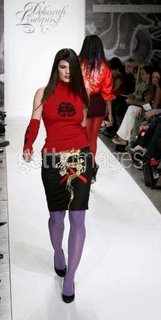
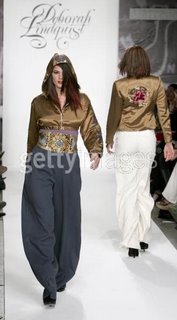
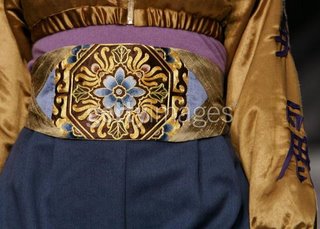
Above: Deborah's Asian-inspired theme featuring recycled kimonos, hand embroidery, hemp/silk blends, and organic cotton/orangic wool blends. Below: Deborah's acclaimed bustiers, recycled wear, and organic materials, including hemp and silks presented in Spring 2006 Mercedes Benz Fashion Week.
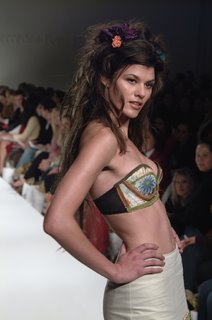
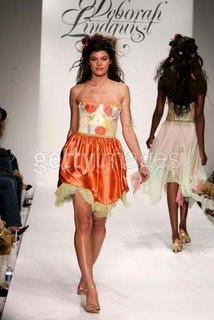

TRACKBACK: London & Durham, UK. 7-14 Mar 2006
Personal recounts from my photoshoot and UK travels with People Tree.
Trade...how boring, right? Even sounds boring + in seems like such a remote topic. Not as "glamorous" as Bird Flu or AIDS or...fashion. Does it have anything to do with me? Well, what if it is linked to your consumer habits? I haven't read a comprehensive study that directly connects global health, poverty and poverty alleviation with trade (haven't really sought one out yet), but its easy to understand that it is, in fact, linked. Global health ---- poverty ---- trade ---- government laws & consumer buying habits.
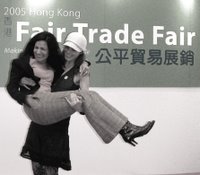
The case of fair trade. It is by far a footnote on the international trade scene, which means there is so much to do! But what do we know about it? While speaking at the WTO Ministerial this past December in Hong Kong, it is clear to me that even some of the world delegates are unfamiliar with the term, let alone the concept. (And these are the people making the decisions of what trade (what and how we buy) will look like in the next 10-20 years)? S.O.S. World of Good has a great definition of fair trade that you can access here. Safia Minney, the founder of People Tree, a force of nature, and a wonderful friend and kindred spirit, also highlights some of the more unforseen pieces of fair trade (in her fashion label) accessed at her blog. But we also know that it helps the groups of marginalized people that are attached to the label. Therefore, providing an interesting case study on global health, poverty alleviation, and family & consumer sciences (among many other disciplines).
Regardless, it was great to be shooting for People Tree and knowing that my work on fair trade issues and fashion in the States is in line with someone half way across the world. Safia, to be working with you and your team is a pleasure, a breath of fresh air...
March 8, 2006
I arrived early at People Tree’s
The Office
Rachael, Steve and the rest of the PR and Marketing staff were on overdrive. In addition to Fairtrade Fortnight, it was announced just a few days prior that Top Shop, a trend-setting UK Department store would be selling some of People Tree’s signature styles until the end of this month (hopefully longer). Fashionable fair trade items have hit an all time high in the
Dreaming up Business
Spoke at length with Safia and Steve on the geography of consumer demand for products such as People Tree in the U.S. Discussed successful fair trade business models that have begun emerging in the last few years; talked about marketing to the U.S. consumer, the upcoming fashion shows…But here for a photo shoot, so need some beauty rest. I fall asleep in the backroom after a hot shower, hit REM pretty fast, whaddyaknow…dreamt about Africa, more specifically Mozambique, and the line of fair trade products [A.D. Schwarz] I will be helping launch next month. The dream was more riveting than that, but was woken up by Safia from my dream-like stupor.
The Road to
Or should I say “Track to
March 9, 2006
Ol’ Country: Horn’s House
Up at 8 AM. Wrapped in organic cotton pants and sweatshirt by Deity Aton, scuffling around in merino wool knee-highs…the chilliness seems to seep through to your bones if you let it get to you. Porridge and hot tea to ward off the fogginess from early morn wakeups…
The clothes, mainly all hand-woven, hand-embroidered and made of organic cotton from close to a dozen cooperatives. (People Tree works with up to 70 different cooperatives across 20 different countries).
First shot: Thick cowl neck natural white alpaca sweater made in Peru. Navy and aubergine A-line pleated skirt
Second shot: Aubergine V-neck cotton dress with white embroidery detailing
Third shot: Boat-neck red organic cotton long-sleeve with vertically-strip chocolate and red strip wide-leg pants
Fourth shot: Sky blue (well not the sky today) organic cotton boat-neck shirt with a super-soft black string scarf and black alpaca slouch cap.
Fifth shot: In the kitchen in an organic cotton full-length nightie sewing a scarf
Sixth shot: Getting down to my skivvies. Black organic cotton briefs and off-the-shoulder v-neck matching long sleeve
(Maybe I'll upload some images when they come in...)
Time to Wind Down
I don’t wear watches – they never seemed to suit me anyway. I easily lose track of time here. Despite the lack of a watch in NYC too, I always seem to know what time it is – you just can’t run away from it. Time just seems to follow you like a shadow there. But here in
March 10, 2006
Austere walls loomed from the street. The castle was both grand and massive (and by far one of the chilliest places I have ever shot in). We shot, however, in some extraordinary pieces that warm your soul: a silk piece with silver and green metallic string embroidered knots and beads from  to run 4 mechanical looms (+ not to mention a heck of a lot of CO2 being belched into the atmosphere), which has replaced the traditional skills of thousands of workers across the world (and contributed to more global warming)...Now do you see the close connection between Solar Power/alternative energy and fashion?? (hint, hint all of you people at Piper Jaffray-sponsored Clean Tech investor's conference!). People Tree has revived that talent of the hand loom, that craft among the women of
to run 4 mechanical looms (+ not to mention a heck of a lot of CO2 being belched into the atmosphere), which has replaced the traditional skills of thousands of workers across the world (and contributed to more global warming)...Now do you see the close connection between Solar Power/alternative energy and fashion?? (hint, hint all of you people at Piper Jaffray-sponsored Clean Tech investor's conference!). People Tree has revived that talent of the hand loom, that craft among the women of
Safia and I have an interview with
MARCH 11, 2006
Hay is for Horses
Oh if only I had pictures of this! We treaded through 20 centimeters of muddy fields early today for some of my final shots. The neighbors brought out their 2 horses for a classically wonderful shot, having me hold two horses in the middle of the hay field. Peruvian, natural color alpaca was the theme for outdoors (did you know that non-white alapacas are being killed because people find no use for them in textiles because you can't dye their wool? YOU GOT TO BE KIDDING ME! There is an endless amount of natural color already there ranging from oranges to grays to slates to deep navy blues to chocolate browns and blacks).
In the bone-chilling weather, my body was warm wherever there was alpaca: knitted sweater, shawls, hat, gloves…all from the alpaca’s native land:
MARCH 12, 2006
My Day Off
I spent most of the day catching up on some much needed sleep as well as working on business plans and on brand design considerations for the A.D. Schwarz line, which will be launched soon enough. Spent some time on the road again, this time to Safia's mothers house. It was great to meet her family - you can see where a number of values start. Straight from home.
MARCH 13, 2006
Back at the U.K. Office
Headed back to the office and took off with a friend to see the TOPSHOP stand featuring Peo ple Tree. Lo and behold my Japanese counterpart and I got stopped by a 14-year old girl and her friend who were "doing a report on fair trade for school" and asked us a 4-page questionnaire on our buying habits, fair trade pricing, and other things. Living proof, that people who are educated on these issues and give a shit are largely from our generation...The 80s and 90s babies!
ple Tree. Lo and behold my Japanese counterpart and I got stopped by a 14-year old girl and her friend who were "doing a report on fair trade for school" and asked us a 4-page questionnaire on our buying habits, fair trade pricing, and other things. Living proof, that people who are educated on these issues and give a shit are largely from our generation...The 80s and 90s babies!
Left: Safia Minney at Top Shop
MARCH 14, 2006
Back to New York
It's the long flight home. Perhaps when I pick up the Financial Times this time, I'll see another article about fair trade. No, not today? No worries, everything will soon shall come.
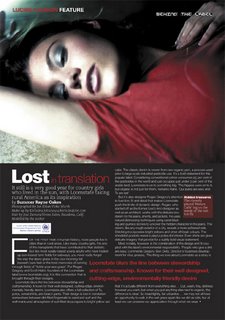
TRACKBACK: Worldwide, 7 Mar 2006
For the sixth series of Behind the Label in Lucire Magazine, Summer Rayne talks about Rogan Gregory and Scott Hahn's label, Loomstate. Photos by Ian Ethan Vloke-Wurth; makeup by Khristina John; Hair by Jose Zamora. Read it here.
...For the first time in human history, more people live in cities than in rural areas. Like many country girls, I'm one of the transplants that have contributed to that statistic. But like most rurally-raised young adults who have traded up sun-kissed farm fields for subways, you never really forget the way the dewy grass in the cool morning felt beneath bare feet or the fond memories of running through fields of "tickle-your-ass-grass." - Summer Rayne in BTL's "Lost in Translation," Lucire Magazine
Personal Recounts of my travels to Singapore...coming soon.

TRACKBACK: Singapore, 22 Feb - 2 Mar 2006
Summer Rayne Oakes flies to Singapore to start filming a new, upbeat international prime time environmental "edutainment" series. Oakes will co-host the series, which is set to debut first throughout Asia at the end of April. Launch dates outside of Asia at a later date. Stay tuned for more information.

TRACKBACK: Worldwide. 10 Feb 2006
The New Century Thinking Institute releases a series of interviews of people leading sustainability in America, including Fashion Conscious, with Summer Rayne Oakes. VIEW THE VIDEO HERE.

TRACKBACK: Worldwide, 1 Feb 2006
Eleven thousand people, 162 nations, streets riddled with protest, and quiet riots happening behind closed doors. What’s this all about? On the surface, it’s about trade. But underneath, it’s about poverty, politics, and the pursuit of happiness...READ THE ARTICLE HERE.
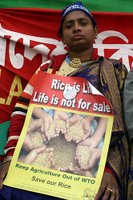
 Don’t get me wrong, I care. I care a whole deal, which is why I was there. But for my generation, we realize that there is a glut of ‘F*** you’ finger-pointing that is clogging the political pipelines, and we are in desperate need of an enema. - Summer Rayne Oakes in article Made in Hong Kong
Don’t get me wrong, I care. I care a whole deal, which is why I was there. But for my generation, we realize that there is a glut of ‘F*** you’ finger-pointing that is clogging the political pipelines, and we are in desperate need of an enema. - Summer Rayne Oakes in article Made in Hong Kong 

TRACKBACK: Worldwide. 1 February 2006

Left: A NY Times photographer caught me buying my free range turkey at the outdoor green market this past Thanksgiving in Union Square (NYC). This is proof of two things. 1) That "Behind the label" is really a look into my closet, and 2) That a 12-lb turkey is no match for my appetite on Thanksgiving Day.

TRACKBACK: United Kingdom. Jan/Feb 2006
Oakes bends over backward for the shot in Aiste B. by Laure Maud for the cover photo of Ethical Consumer Magazine. Ethical Consumer is the UK's only alternative consumer organisation looking at the social and environmental records of the companies behind the brand names.
The same photo was also used as an insert in Le Nouvel Observateur, France's popular and long-running lifestyle magazine in the article, "Bon chic, bonnes intentions."


TRACKBACK: Chicago, IL. Jan/Feb 2006
Oakes writes an article on eco-fashion geared towards teen readers in Supermodels Unlimited with editorial featuring Linda Loudermilk's re-created rock vintage dresses and Mercado Global jewelry.

Summer Rayne supplies some off-the-cuff, sexually-charged style advice for the Eco Chick reader.
What do sex toys, hybrid cars, fashion, opinions galore, and organic food have in common? Ladies love ‘em. For too long environmental blogs have catered to men and moms. It was either diatribes about peak oil or recipes on how to make organic baby food. When all the rest of us want to know is: Where can I get a fair trade spanking paddle? Eco Chick can fill you in!
The blogteam at Eco-chick includes a model who has a degree in entomology, an alternative health freak who’s used herself as a guinea pig, a science nerd, a news junkie and a Barcelona-based expat; the site is run and hosted by an anarchist webmaster. Today’s chicks want to know what’s going on, and wants to laugh. Eco Chick agrees.
 ins and outs of your carbon footprint to jump on and read our blog. Eco Chick is for women and men who are looking for some fun in their green news from writers who aren’t afraid to mix it up,” - Eco Chick’s founder, Starre Vartan.
ins and outs of your carbon footprint to jump on and read our blog. Eco Chick is for women and men who are looking for some fun in their green news from writers who aren’t afraid to mix it up,” - Eco Chick’s founder, Starre Vartan.

TRACKBACK: New York, NY. 30 Jan 2006
Good friend Mark Ritchie (Founder, President of the Institute for Agriculture and Trade Policy and the fellow who assisted in flying me out to the Fair Trade Expo in Hong Kong) is running for Minnesota Secretary-of-State. Mark invited me to his political fundraiser in NYC at Anne Hess and Craig Kaplan's House. The night was shared with two other political strongarms, but it was Mark, who wooed the crowd of people. Mark has a very commanding, albeit welcoming and trusting presence. A leader by nature, brought into politics with the realization that he can make a major difference. Truly awe-inspiring speech, enough for me to think about getting into politics in the future. God knows I've been around them enough as of late. ;o) Wish you the best Mark, look forward to discussing more about biopolymers and fair trade when you win the race.

TRACKBACK: New York, NY. 25 January 2005
Sources tell us the eco-chic glitterati from around the world will be descending on Libation in NYC on January 25 for ICInyc, "a roving celebration of frontline visionaries blending fashion, design, media and the arts with the modest task of saving the planet." The evening's stimulation begins at 7 pm with an organic wine and vodka tasting courtesy of Organic Vinters and Orange V followed by the sweet decadent treats of Green & Black Chocolates. As the beats move from smooth to solid, the Green Fairy will tempt you with her magin potions as she glides through the throng of revelers moving to the sounds of guest DJs Learned Evolution and Evil Genius. The crowd, building toward a pulsing climax, will blissfully dance, mingle and mix until late in the evening.
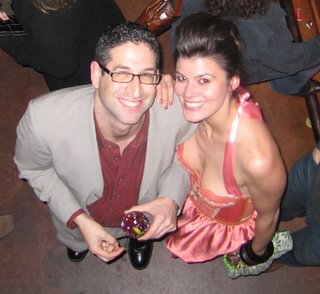
"ICInyc's chemistry comes naturally. We strip down the
 anatomy of sustainability to its most vital parts, and then uncover the sweet spots of sexiness and style." - Summer Rayne Oakes, co-founder of event.
anatomy of sustainability to its most vital parts, and then uncover the sweet spots of sexiness and style." - Summer Rayne Oakes, co-founder of event.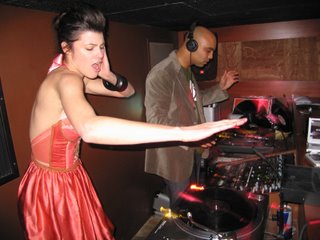 Images. Above - the ICInyc invite with a design by Lidia Amirova. Left - getting down with the Evil Genius. Right above - With Vivavi CEO, Josh Dorfm
Images. Above - the ICInyc invite with a design by Lidia Amirova. Left - getting down with the Evil Genius. Right above - With Vivavi CEO, Josh Dorfm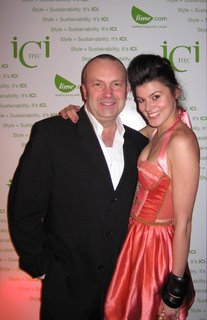 an. Below right - with good friend, Jim - former President of L'Oreal U.S., Director of Beauty & Fashion Channel, and CEO of Sexy Hair. Below left - with Managing director of Recyclebank, Ron Gonen. Wardrobe watch: dress
an. Below right - with good friend, Jim - former President of L'Oreal U.S., Director of Beauty & Fashion Channel, and CEO of Sexy Hair. Below left - with Managing director of Recyclebank, Ron Gonen. Wardrobe watch: dress 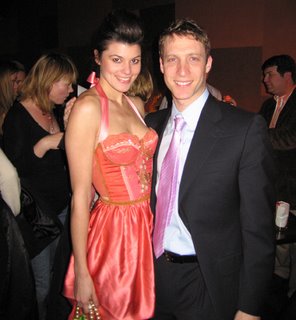 by Deborah Lindquist | bracelets by A.D. SCHWARZ
by Deborah Lindquist | bracelets by A.D. SCHWARZSee who showed up, find more photos, and read the press release at ICI-nyc.com.
Event photos courtesy of Jon Moe.
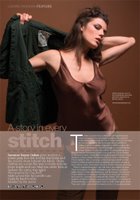
TRACKBACK: Worldwide, Dec 2005
Summer Rayne features the work of heriloom label, Project Alabama, in the December issue of Lucire Magazine. Oakes will also be working on a pilot TV program for which she filmed Project Alabama behind-the-scenes during Spring 06 Fashion Week in New York City under the tents and will finish filming in May 2006 in PA's hometown.
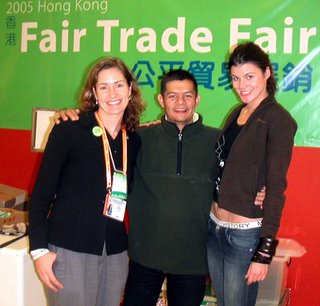
TRACKBACK: Hong Kong, China. 13-16 Dec 2005
Summer Rayne will be the lead model and spokesperson for the Fair Trade Symposium in Hong Kong. During the press conference (Dec 13), Oakes will speak of the benefits of creative business models that utilize fair trade to help economically-disadvantaged nations; she will also speak of the relevance of having the Fair Trade Symposium in conjunction with the WTO Ministerial talks. The following day, model Oakes will walk the runway for the Fair Trade Fashion Show sponsored by People Tree. People Tree is a fair trade ecology fashion label headquartered in Japan and London. The label, founded by social entrepreneur Safia Minney, works with 70 cooperatives spanning 20 countries and has won staunch support from a number of wearers. READ MORE HERE.

"Human rights at work, environment, and human health, particularly in developing or least developed countries have been overshadowed by global trade rules in the past," comments Oakes. "The purpose of the Fair Trade Symposium and People Tree’s fashion show is to demonstrate that by providing fair wage and fair prices, families and their communities are given opportunities that wouldn’t otherwise be made available."

"Summer Rayne has been and continues to be a leader for fair trade in fashion. Her involvement in the fair trade fashion show in Hong Kong is very important. It helps demonstrate to trade leaders the broad support for the fair trade movement from countries around the world and from all segments of the fashion industry."
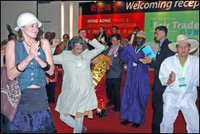
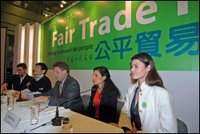 Images: Top - with Patricia Jurewicz, organizer of the Fair Trade Expo and with IATP and Denis Alfredo Cruz, President of Cosagual, one of the producer groups. Wardrobe Watch: organic cotton tee by Linda Loudermilk and organic cotton track shirt by Deity Aton; bracelets by A.D. SCHWARZ. Left - at the press conference. Wardrobe Watch: Organic wool jacket by Delano Collection. Right - Dancing with all the producer groups at the expo. Wardrobe Watch: Vintage cloche cap; sustainably-harvested, fair trade bracelets by A.D. SCHWARZ; recycled, handmade two-piece suit by Sarah; organic cotton bag by Linda Loudermilk.
Images: Top - with Patricia Jurewicz, organizer of the Fair Trade Expo and with IATP and Denis Alfredo Cruz, President of Cosagual, one of the producer groups. Wardrobe Watch: organic cotton tee by Linda Loudermilk and organic cotton track shirt by Deity Aton; bracelets by A.D. SCHWARZ. Left - at the press conference. Wardrobe Watch: Organic wool jacket by Delano Collection. Right - Dancing with all the producer groups at the expo. Wardrobe Watch: Vintage cloche cap; sustainably-harvested, fair trade bracelets by A.D. SCHWARZ; recycled, handmade two-piece suit by Sarah; organic cotton bag by Linda Loudermilk. For a link to more images, click here.
about
- From the frontlines: Tracking the latest news, updates, and projects of Summer Rayne Oakes
last posts
- Launched New Site and Don't miss THIS conference c...
- We're Moving
- Financial Times Germany Talks Sustainable Style
- Summer Rayne talks Planet Green, Green-Collar Jobs...
- Hometown Paper Highlights Career
- Two Dozen Long Stem Roses
- Sustainable Style: Trend or Movement? What do Stud...
- Behind-the-scenes at LOHAS
- Funniest Response to my Insect Terrariums
- Welcome to 21 new additions to the family
archives
- March 2006
- April 2006
- May 2006
- June 2006
- July 2006
- August 2006
- September 2006
- October 2006
- November 2006
- December 2006
- January 2007
- February 2007
- March 2007
- April 2007
- May 2007
- June 2007
- July 2007
- August 2007
- September 2007
- October 2007
- November 2007
- December 2007
- January 2008
- February 2008
- March 2008
- April 2008
- May 2008
- June 2008
- July 2008
- August 2008
eco fashion sustainable style ecofashion green fashion eco style sustainable design fair trade Summer Rayne Oakes global warming climate change youtube myspace eco organic green balance health wellness environment fashion fashion trends planet style fashion week
